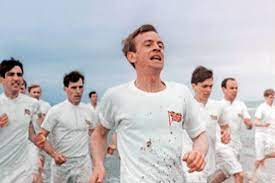Viljen til Sejr
Everybody
knows the image of running in the surf to Vangelis’ “Chariots of Fire”. Certainly,
if you have attended or watched any sporting event. But that is also all I knew
of the movie behind this image before now. Probably a mistake on my side.
“Chariots
of Fire” is a movie about a group of British athletes preparing for and
competing at the Paris Olympics in 1924. The two main characters are Harold
Abrahams (Ben Cross) and Eric Liddell (Ian Charleson) with a rivalry implied
between them.
Abrahams is
a Cambridge student and a son of a wealthy Jew of Lithuanian origin. This has
placed a chip on Abrahams’ shoulder and he feels everything he does is to prove
the prejudice of others wrong. A sentiment that is both motivating him and threatening
to push him over the edge, both in terms of his own mental health and other
people’s acceptance of him.
Motivation
is something Liddell has plenty of as well. Liddell is strictly religious, born
in China of missionary parents and destined to take over the mission
eventually. Liddell is also very fast and when he runs, he is convinced he is
doing God’s will and honor him by winning. The upshot is that Liddell fights
and exerts himself 120%, making him extremely fast, even in adversity.
Abrahams
sees Liddell as his only real competition in Britain and during a race in
Scotland where Abrahams lose to Liddell, he takes on his coach, Sam Mussabini
(Ian Holm) to give him that extra edge, something frowned upon by the elitist Cambridge
board who do not like professionalism.
At the Paris
Olympics the expected duel on 100 m between Abrahams and Liddell is cancelled
when Liddell refuses to run on a Sunday and instead runs the 400 m race. The
personal duel instead becomes a transatlantic duel where the British runners are
pitted against American runners.
The classic
sports movie is about setting a team, practicing and then competing (to win,
understood) and “Chariots of Fire” does follow this formular, even if the team
is only understood as the runners picked for the Olympics. The thing that makes
“Chariots of Fire” interesting is the motivation of the athletes. As the character,
Lord Andrew Lindsay (Nigel Havers), remarks, for the others, running is a fun hobby,
for Abrahams it is an obsession. Lindsay is a good hurdles runner, but without
that extra motivation he will not be more than good. Abrahams and Liddell are
fueled by something else, and this is what is explored and the reason for
watching this movie.
Another element,
which at least for me, makes the movie interesting, is that it is largely a true
story. Abrahams and Liddell are real characters and the portrait of them is
quite faithful. Some details are modified (Liddell found out he was running on
a Sunday and changed to 400 m already before departure for Paris), but the
essence is true. This makes it a window into another age where sports were
considered a bit differently than today with athletics being a gentlemen’s sport,
well dressed at all events and a code of conduct which already in 1924 was becoming
antiquated. To see these British athletes in suits next to their American
counterparts in tracksuits is like watching the past and the future in a single
image. The List has had movies from the 36 and the 64 Olympics and while the style
of them are very different, they serve to demonstrate a development in the attitude
towards sports.
Then of
course there is the famous scoring by Vangelis. I am constantly reminded of his
scoring for “Bladerunner”, as different a movie to “Chariots of Fire” as it is
possible to make them, and a part of me is thinking that so similar a score
cannot possibly fit so different movies. In “Gallipoli” the electronic score
was definitely a clash, but there is something about the patos in Vangelis
score that against odds actually makes it work here. Or maybe the theme song
has just become so associated with sports, particularly athletics, that
intuitively it works. I may just have become conditioned to think that this is
the sound of a sprinter in slow motion.
I liked “Chariots
of Fire” more than I thought I would. It is an interesting watch even if the
drama element is kept at a minimum, but I am wondering what made the Academy award
it four Oscars, including Best Picture? This is the year of “Raiders of the
Lost Ark” and “Das Boot”. Still, I do recommend it.

You like this more than I do. I contend that two months after you see this, the only thing you'll remember is white guys running in slow motion on a beach.
ReplyDeleteThat is very likely true. The drama really is at a minimum. The things I liked about the movie are not exactly the things I will remember a few years down the line.
DeleteI watched this on an airplane when it came out and I remember liking it even though we landed before the movie was over!
ReplyDeleteHa ha, it actually says something about the movie that you can like it without watching the end .
Delete